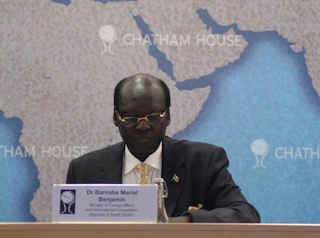South Sudan downplays prospect of genocide
May 2, 2014 (JUBA) – A South Sudanese official on Friday downplayed the prospect of the country’s ongoing conflict turning into a genocide, saying it was being misinterpreted.

“So all this we hear about warning of genocide is just too much interpretation,” he added.
The minister strongly denied possibilities of genocide in the country “because there was no ethnic war”, reiterating that what happened was an “attempted coup” which resulted into a rebellion and the struggle for power.
“You find a lot of explanations expressing different views on this conflict but certainly you will find someone saying there is going to be genocide because what is going on a rebellion. It is not an ethnic conflict like what happened in Rwanda. In this country, you find all various ethnic groups living together across the line,” said Marial.
“So, sincerely speaking, I think as the peace process, the cessation of hostilities has been signed; the issue of genocide is far away. It can be averted,” he added.
The senior government official did acknowledge that massacres took place in Unity and Upper Nile state capitals, but dismissed any genocidal links to these incidences.
The UN says more than 200 people were killed when opposition forces recaptured the oil-rich town of Bentiu from government troops three weeks ago.
“You have seen that in Malakal and also in Bor, but this do not mean there is genocide. Yes there has been a mistake, especially in Bor, which was under the control of the government where some youth just tried to attack the unarmed civilians,” Marial told reporters in the capital, Juba.
He said the Juba government had already taken steps to try to hold accountable those responsible for the killings that occurred in recent weeks.
“So the issue of genocide is not the issue. What we should concentrate on now is how to bring the peace as soon as possible, in order to avoid revenge killings and massacres that happen out of hatred or fighting but people are not killing each other because of their ethnicity,” he said.
US secretary of state John Kerry has warned of a possible genocide in South Sudan unless concerted measures are taken to rapidly arrest the ongoing violence.
“There are very disturbing leading indicators of the kind of ethnic, tribal, targeted nationalistic killings taking place that raise serious questions,” Kerry said.
“Were they to continue in the way they’ve been going could really present a very serious challenge to the international community with respect to the questions of genocide,” he added at a meeting in the Ethiopian capital, Addis Ababa.
Kerry also visited Juba where he held talks with President Salva Kiir on the country’s conflict. He later told reporters that president Kiir was ready for talks with the rebels.
PUNITIVE ACTIONS
James Okuk, a Juba-based political commentator, said Kerry’s visit sent strong signals to the international community of the high level involvement of the US administration to ensure peace peace was attained in the new nation.
“My reading of this visit is in three fold: it is indication of the response to the growing pressure on president Obama administration by activists and lobbyists. It also marks the first step to high level involvement of the US to finding solution to this conflict. The United States does not want another Somalia so it wants to avoid such scenario from happening at any cost,” Okuk told Sudan Tribune.
“America also does not want to be embarrassed for the role it played in the independence of this country,” he added.
The analyst, however, expressed optimism of the positive impact of the US secretary of state’s visit, saying it would force the warring sides to accept dialogue.
“There is going to be a positive impact because neither the government nor the rebel group would like to be seen an obstacle to the peace process. They will all accept so that they are not sanctioned,” Okuk told Sudan Tribune.
“They will now recommit themselves to accelerating efforts that encourages peace and reconciliations,” he added.
(ST)
